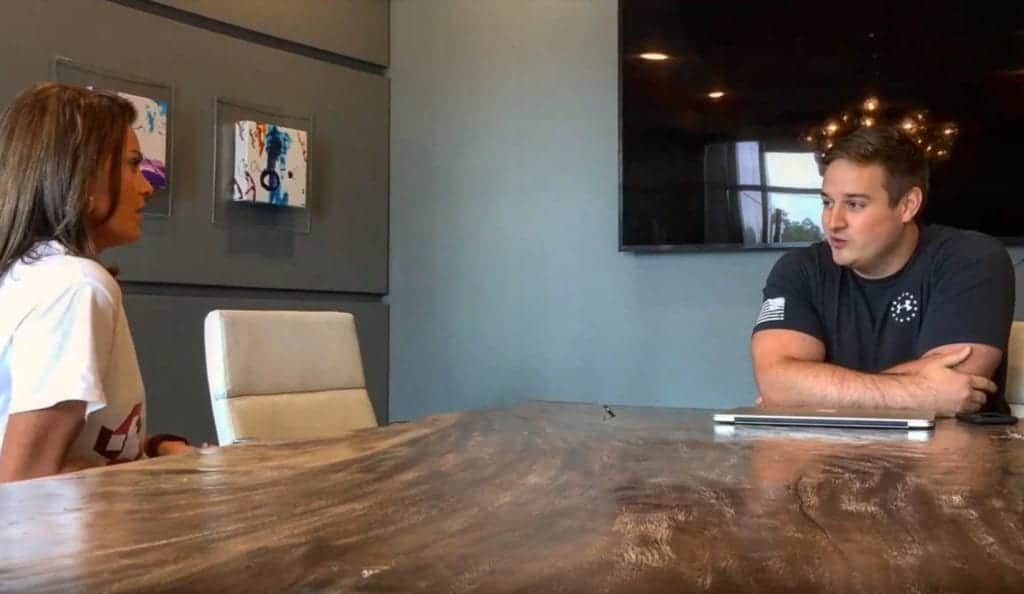One of the most popular articles on my blog is my Precision Nutrition Certification Review. If you’re unfamiliar with Precision Nutrition, they’re a leader in the nutrition coaching certification (and nutrition in general) space. Thanks to this article, I receive a ton of questions about how to become a nutrition coach, the best nutrition coaching certifications, and whether or not a college degree is a good move.
I could write 20,000 words on this topic, but I’ll keep it to the point (about 1,500 words). I’ll also give you a 5-step approach for nutrition coaching success if you want to go the self-employed route right out of the gate. Hint: it doesn’t require a certification or degree.

Disclaimer: Depending on your location, there could be laws or regulations surrounding nutrition coaching and the legality of providing nutrition information. I’m a personal trainer/nutrition coach turned food blogger, not a lawyer. So do your research beforehand. If you’d like to read a good overview of this, Precision Nutrition has a solid guide here.
Do I need a college degree to become a nutrition coach?
The short answer is no. I have a nutrition degree but didn’t complete a dietetic internship to take the RD (registered dietitian) exam. Meaning, I might as well not have a college degree for any regulatory reasons.
However, there are pros to having a college degree. For starters, getting a degree in nutrition isn’t a walk in the park. It’s a science degree with in depth courses on human metabolism, biochemistry, and all that fun stuff. You’ll also learn how to run a kitchen and tons about medical nutrition therapy.
Not only will that prepare you to be an eventual expert in the field of nutrition, it’s a big differentiator in finding a job in the field. Which brings me to my next point: nutrition coaching isn’t really a job yet. Lemme ‘splain.
While there are thousands of fitspo nutrition coaches nowadays, there aren’t many companies hiring nutrition coaches outright. Stronger U (I’m biased) would be an example of a bonafide nutrition coaching company that hires nutrition coaches directly, but you won’t find their jobs advertised on any job boards. More on this in a minute.

That means nutrition coaching is kind of a Wild Wild West situation where you’ll have to be a self-branded coach OR be multi-talented and work at a gym as a coach/trainer in different capacities. Having a degree could get your foot in almost any commercial gym door which is actually a great place to start despite what anyone tells you.
Bonus: Having a degree will allow you to sit for more prestigious, nationally recognized certifications that require a degree. A downside of the PN certification is that they don’t have any prerequisites. Meaning, anybody can get the certification and the exams are open book. That’s not great for quality control. I got the CSCS certification after graduation and while I can’t speak for all the degree-required certifications, this one has personally opened doors for me.

Do I need a certification to become a nutrition coach?
Again, the short answer is no. Using the Precision Nutrition certification as an example, when you become certified nothing actually happens. You won’t find any companies lining up to hire you or people lining up to work with you as your client. A certification can give you the skillset and can usually help with lining up liability insurance (which you need FO SHO).
In my PN cert review I wrote about how their certification covered most of the high points of what you would learn throughout a 4-year nutrition degree and even took the coaching psychology and behavior change topics even further. It’s a solid base skillset for nutrition coaching. So I don’t want to discount that. If you’re starting from scratch and are new to nutrition as a whole, a nutrition coaching certification makes a lot of sense.
But let’s say you know your stuff and you possess the most valuable skill any nutrition coach can have (getting results). There are ton of amazing and successful nutrition coaches that have never even considered a certification. If you think you’ll fall in this group, a certification is just going to give you a piece of paper and not much else. So what should you do?

Note: While getting results for yourself (left) are important, getting results for clients (right – Emily of em_gingerlifts) is a totally different thing.
How to Become a Nutrition Coach without a Degree or Certification in Five Steps
Before I get into the five steps, I want to reiterate the value of both a nutrition degree and nutrition coaching certification. Starting out as a nutrition coach working for someone else or even as a personal trainer will likely require one or both of them. And starting as an employed nutrition coach will make your life SO much easier.
The five steps below are geared more towards the person who’s wanting to be a self-employed nutrition coach from day one.
Step 1
Find nutrition coaches or companies that share your same approach to nutrition and, this is important, have a stellar track record of getting results for clients. (I.e. calorie or macro based coaching, vegan and whole foods coaching, low carb or keto coaching, or whatever)
Step 2
Pay one to coach you. Or if you’re 100% an expert and don’t need coaching, pay one for their secret sauce.
Pro tip: the coaching will be cheaper and you’ll develop a relationship instead of a few calls or meetings.
Step 3
Now that you’ve built a solid relationship with a successful nutrition coach and learned their coaching ways, rinse and repeat. Hire another one. Let’s say you spend $150/month. You could pay for six months of coaching or a certification. The time you spend on steps 2 and 3 will vary based on your level of experience and knowledge. But I’d venture to say there’s a direct correlation between how long you spend on these steps and your skills as a nutrition coach.
Bonus pro tip: having a nutrition coach for six-plus months probably means you’re getting shredded and that’s never bad for business.
Step 4
Talk to your coaches about your desire to become a nutrition coach. They’ll help in any way they can. I promise.
Bonus bonus pro tip: offer to help your coach in any capacity. Client onboarding, systems, email management, or anything that could make a nutrition coaches life easier.
Step 5
This is a controversial point but unless you get a job for someone else or a gym, I think you should work for free in the beginning and fake it til you make it. You have no social proof in the beginning and unless you’re extremely fit, it’s going to be tough to convince others to pay your for coaching.
I will add that people (including you) won’t take free as seriously since there’s nothing at stake, so you’ll need to get creative with incentives and make sure you’re both treating it like a business. If you get in good with a successful coach or company in step 2 or 3, you may be able to help enough that you start taking on a few client referrals from them.
Client acquisition is the toughest part of becoming a nutrition coach, and I imagine the early stages are why so many coaches flame out.

The Takeaways
And that’s about it. Somewhere along the lines, you should be posting about your personal journey and sharing information. People need to associate you with nutrition, food, fitness, and all things related to not being a couch potato. If you’re uncomfortable with this, sorry, it comes with the territory. Oh, and btw, nobody will care at first. Get ready for the crickets.
Also, you might be thinking, “But I wanna become a nutrition coach right now.” And that’s exactly why I’d recommend the above. Nutrition coaching is tough, and it’s not for everyone. Not to mention, interests change. The nutrition coaching field already has enough attrition, don’t be a flame out.
My dream scenario for you as a hopeful nutrition coach would be to find a successful coach who’s doing what you want to be doing, develop a relationship with them, and start taking on a few clients slowly while working your current job as you build your coaching business. Save the money you’d spend on a certification or degree and put it towards gaining experience (through the coach you hire or paying them for time) and developing those relationships (go to seminars, conferences, hangouts, or send non-creepy/fun gifts).
And the longer you can build your nutrition coaching business as a side hustle, the better. Focus on getting your clients amazing results in the early stages when all you’ll want to do is focus on client acquisition. A few rockstar clients are worth 50 mediocre clients.
I hope this was helpful. Let me know if you have any follow up questions in the comments. And if you’re interested in becoming a fitness or food blogger, check out my posts on how we started a blog that earns $20k per month and how I got 175,000 Instagram followers.


Ellen
Sunday 17th of January 2021
I’d like your two cents. Just reading this tonight. I’m a former teacher looking to dive into a new career but at 59 not sure getting another 4 year degree is viable. I love the idea of being a nutrition coach because what I need is what I think I can do for others. Not sure at all where to start. Side hustle is doable and maybe the degree since I already have one (wouldn’t have to take ALL the classes). Been with a personal trainer for several years and can see results of that. Thank you for your time in advance.
Mason Woodruff
Thursday 21st of January 2021
I'm sure you'd be able to relate to the nutrition struggles of teachers and women around your age better than most "young" coaches. I say go for it. If you've worked with a personal trainer and found value, the same would likely be true for a nutrition coach. I wouldn't spend too much time mulling over degree vs certification. Just get started by either self-educating, working with a coach yourself, or offering some time helping a coach you'd like to emulate.
Lowaldo
Thursday 10th of September 2020
Great Write up - Thanks!
Kaylie
Saturday 29th of December 2018
Hi Mason, you have a great, easy to read writing style. I am an overseas trained mD and I’m doing to Mayo clinic health coaching course. I want to add to my practical skills in fitness and nutrition so was thinking of doing PN and a personal trainer course. I have a post grad dip in Sports Med but want more skills in exercise prescription (my niche will be women age 35+). What PT course do you recommend?
Mason Woodruff
Monday 31st of December 2018
Thanks, Kaylie. I would probably start with some of the larger organizations like the NSCA, NASM, or ACSM. The certifications that require prerequisite educations (mostly a bachelor's degree) are great industry separators, but the scope of something like the CSCS (NSCA) probably doesn't align with your demographic. There's no need to over certify if your goal is to simply work with people. If the goal is to get a training/coaching job somewhere, however, the higher level certs may be the way to go with your education. Hope that helps!
Gerard Briggs
Thursday 8th of November 2018
Mason,
Great article. I read your review of the PN Level 1 course. They have a level 2 course. Can you take the level 1 then enroll in the level 2 course and get credit for the Level 1 material? I'm looking into taking the NSCA Certification and I think this certification will be a good compliment to my PT business. Thanks for your review.
Mason Woodruff
Thursday 8th of November 2018
Thanks, Gerard. If I'm reading your question correctly, you have to complete the level 1 before you have access to level 2. I could be wrong, but I'd definitely ask and see. You may be able to enroll in both simultaneously since they only do quarterly (or maybe 2x/year) enrollment.
Alison
Tuesday 30th of October 2018
How many clients do you recommend taking to start out? What is a reasonable amount of clients? What is too few or too many?
Mason Woodruff
Tuesday 6th of November 2018
It's highly individual. As a blanket statement, though, I'd say as few as possible so you can really focus on them. Getting your initial clients great results will give you social proof and confidence as a coach. And in turn, grow your client load/business. You may also find that you like coaching as a "side gig" that supplements your income at another job. I see a lot of people dive in head first and drown trying to grow their business.